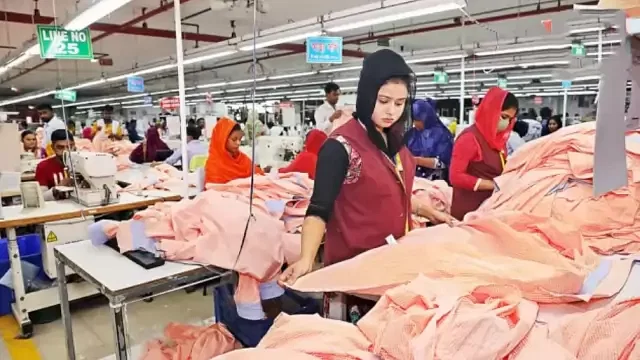Industrialists had no intention of shutting down their readymade garment factories, despite the outbreak of novel coronavirus. And the government was with them on this. This stand of the factory owners along with the indecision and lack of coordination between the labour ministry and the commerce ministry, has led to a hazardous situation.
Violating all directives of social distancing, thousands of garment factory workers have flocked back to Dhaka and surrounding industrial belts. Other than very few, even the leaders of various labour organisations didn’t protest strongly against the factories being reopened during the crisis.
A BKMEA leader said, the factory environment is better than the environment of workers’ homes. And that all the factories had facilities for hand-washing and other preventive measures against coronavirus.
From Saturday morning, throngs of workers have been streaming towards the capital city, mostly of the readymade garment industry. After it had been announced that the factories would reopen on Sunday, they made a desperate bid to return to the city in any way that they could. Pictures in the media of the workers returning in hordes to their work places drew sharp public criticism. The owners were castigated for aggravating the risk to public health. It was only at nearly 10 in the night that the apex body of readymade garment manufacturers, BGMEA, finally responded and asked its owners to keep their factories shut. And the knitwear manufacturers association BKMEA issued a similar directive, but at midnight. After that, the police shut all entries and exits to and from Dhaka.
The past 15 days
How did such a situation arise? It was learnt that on 21 March a meeting was held at the labour ministry between the owners, labour representatives and government officials, with state minister for labour Begum Monnujan Sufian presiding. The meeting was attended by a present and a former president of BGMEA, the BKMEA president and a vice president of the association, president of the ruling party’s labour front Jatiya Sramik League and senior officials of the labour ministry.
At the meeting, most of the representatives of the garments industry owners and the president of Jatiya Sramik League, spoke in favour of keeping the factories open.
Rather than whether to keep the factories open or not, the industrialists were more focused on discussing the financial grants and stimulus packages to be provided by the government. At the end of the meeting, a BKMEA leader said, the factory environment is better than the environment of workers’ homes. And that all the factories had facilities for hand-washing and other preventive measures against coronavirus.
The next day the state minister for labour held a meeting with 21 labour organisations at the ministry. At the meeting, leaders of 9 labour organisations demanded that the factories be shut down due to the coronavirus crisis. However, 11 organisations opposed this. The state minister said that for the time being the factories would remain open. She said she would speak to the prime minister and then a decision would be taken about whether the factories would close or not.
Two days after this meeting, a number of influential garment factory owners said they would not shut the factories. They wanted the government to announce this decision. They even hinted that their decision would help in getting the benefits as demanded by the industry owners. That was why the BGMEA and BKMEA leaders remained silent even when the government on 21 March announced the 10-day holiday.
On 25 March the prime minister announced a Tk 50 billion package for the garment industry, so that the workers’ wages could be paid. The industry leaders hailed this decision immediately. And then when the 10-day holiday started, BGMEA asked its members to keep the factories closed. The next day BKMEA followed suit. However, certain influential garment factories owners were irate at BGMEA’s decision and approached senior levels in the government, saying that the closure would harm readymade garment exports. Yet, till 26 March, purchase orders worth USD 2.67 billion of 959 factories had been cancelled and suspended.
On 28 March, the labour ministry’s Department of Inspection for Factories and Establishments (DIFE) issued a notice stating that the government did not give any orders to close the factories that had purchase orders and also which were making PPE, masks, gloves, sanitisers, drugs and other items for the prevention of coronavirus. After this notice, BGMEA somewhat moved away from its stand and requested its members to follow the DIFE directives.
Amid the dilemma over opening and closing the factories, on 1 April commerce minister Tipu Munshi held a meeting regarding the situation in the country. BGMEA and BKMEA leaders were present at the meeting. Munshi himself had been a president of BGMEA in the past. At the meeting he said there were no restrictions to keeping the factories open, as long as the health regulations were maintained. The meeting spoke about opening the factories on 5 April.
DIFE issued another notice on that day, reiterating its stand. The next day BKMEA withdrew its directives to keep the factories shut. BGMEA remained silent till Saturday. But the Ashulia zone factory owners on their own initiative had announced their decision to open their factories from Sunday and informed BGMEA accordingly.
After facing sharp criticism, BGMEA on its Facebook page late Saturday night announced that it did not have the authority to keep factories closed. That was DIFE’s jurisdiction. Yet there is clear precedence of BGMEA keeping factories shut in the interests of its members. In 2016 when workers launched a movement in Ashulia for increased wages, BGMEA kept 59 factories closed for 4 days.
The labour ministry and commerce ministry failed to take a strong stance from the beginning. No one wants to take the responsibility of closing the factories, thus leading to the present predicament.
*This report appeared in the print edition of Prothom Alo and has been rewritten in English by Ayesha Kabir
